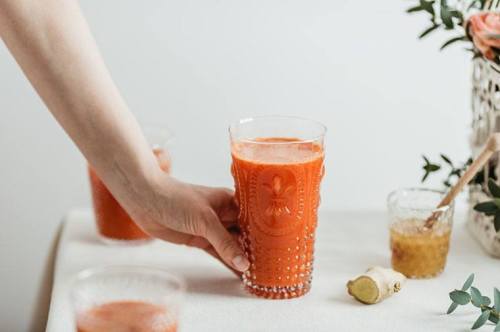January might as well be Latin for “time to revamp your eating plan,” because it can seem like everyone you know is either doing Whole30, vowing to go keto, committing to a vegan life, or sticking to anti-inflammatory foods. And though it may not be as trendy as it was a decade ago, plenty of people are resetting their system with a good old-fashioned juice cleanse.
This is controversial, of course. In one camp, you have wellness experts who say it’s good to reboot your system, wiping out all the nasty gunk that’s been hanging around in there. And hey, intermittent fasting—a component of many cleanses—can be good for the metabolism. But then you have the health experts in the other camp who believe that juice has way too much sugar and the whole trend is not only overhyped, but harmful.
Richard Lin, CEO of the customizable probiotics company Thryve Inside, decided to do a little investigating in order to find out exactly what happens to the body when someone goes on a juice cleanse. For his research, he took in-depth looks at 10 participants’ microbiomes before, during, and after an eight-day cleanse.
While his experiment doesn’t definitively proclaim one stance on juice cleanses as the “right” one, it does give some helpful—and surprising—insight into the process’ health effects by taking a truly inside look at how the gut reacts.
Keep reading to find out how going on a juice cleanse affects the microbiome.

It gives an inflammation-fighting bacteria strain a boost
Just hours into the participants’ juice cleanses, Lin and his team saw something really interesting happen: There was an increase in the amount of a specific bacteria strain called phascolarctobacterium. “This bacteria, in very high levels, is protective against issues like inflammatory bowel disease, eczema, asthma, and obesity,” Lin says. “When the levels of this bacteria is decreased, you see more of those issues.”
The inflammation-fighting bacteria continued to increase throughout the cleanse, ultimately doubling the amount that was in the gut before. “Part of the reason for the increase could be from the fasting,” Lin says. “The nutrients in the juices could also contribute to the growth of this specific bacteria.”
Based on his research, even replacing one meal with a juice could help you reap the benefits—you don’t have to go all-out and juice-only for days on end.

It could make your sushi night a lot more beneficial post-cleanse
Lin and his team saw an increase in another very specific bacteria: bacteroides plebeius, which helps the body digest seaweed. A little random, right? “We’re still trying to figure out why we saw this increase,” Lin says. “It could be that the test subjects already had this bacteria in their gut and a nutrient in the juices was feeding that bacteria, causing it to grow.”
Here’s why it matters: Unless you grow up eating seaweed-based foods on the reg, it’s typically something most people can’t easily digest. And that’s unfortunate because it’s full of health benefits like vitamins A, C, and E, as well as iron, magnesium, and calcium. When the body has trouble digesting it, the nutrients don’t get distributed in the body—it just goes right through you. So having a digestive system that can break down seaweed-based foods more effectively can give your body a boost.
Lin’s experiment aside, the arguments for and against going on a juice cleanse are still there. Ultimately, like any dietary change, how you feel is going to be the best indicator for whether something is helping your body or hurting it.
Going on a cleanse is definitely not the only way to give your gut a boost. Well+Good’s (Re)New Year program has you covered! But if you have persistent gut problems, you might want to consider the low-FODMAP diet.
Sign Up for Our Daily Newsletter
Get all the latest in wellness, trends, food, fitness, beauty, and more delivered right to your inbox.
Got it, you've been added to our email list.











